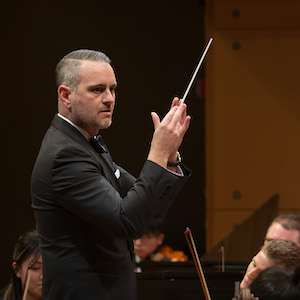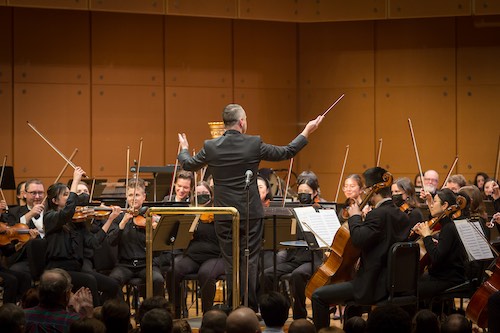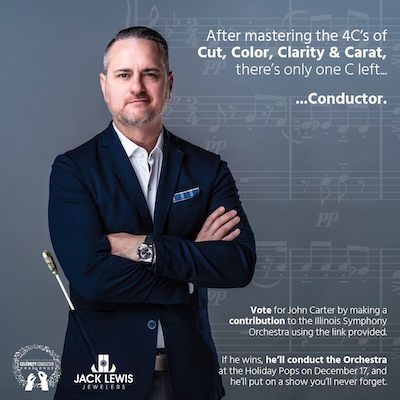
When John Carter, president and CEO of Jack Lewis Jewelers in Bloomington, Ill., raised the most money in a contest sponsored by the Illinois Symphony Orchestra, he wasn’t all that excited about being declared the winner.
That’s because the prize was a once-in-a-lifetime experience that for some would be a dream but for others a nightmare: the chance to act as “celebrity conductor” for an audience of 500.
This was definitely outside Carter’s comfort zone. “My wife is a classically trained singer,” he says. “But I am not a naturally musical person.”
On top of that, the timing wasn’t great: He’d have to wield the baton during the symphony’s annual Holiday Pops in the Heartland concert, which took place on Dec. 17—the height of the Christmas season.
“In the middle of December, no retailer wants another thing to do and another thing to stress about,” he says. “But one of the things that sold me on it was, if you win, you get a lesson with the conductor. I thought, Oh, that would be kind of interesting.”
The assistant conductor, Jacobsen Woollen, came to his office and told him he’d be conducting the 4-minute “Hallelujah Chorus” from George Frideric Handel’s Messiah, complete with not just an orchestra but also a live choir.
“We watched it on a loop a few times on YouTube,” he says. “He gave me some pointers, when it comes to the crescendo, how the song ends.”
For the next week, Carter practiced a couple hours a day at his store before it opened, listening to the piece over and over while he waved his arms.
“I’m sure on the store security cameras, I looked like a goof,” he says. “My wife put it the best, when she said the role of the conductor is not orchestrating the music, so much as helping the orchestra, giving them their energy, telling them what tempo to play, how animated they should be. That allowed me to just focus on the parts of the music where it slows down and have the tempo of the baton match that, and to know when it stops and starts.
“It’s a tricky song because at the end when the hallelujahs stop, there’s silence for about 5 seconds, and then it picks back up with the final hallelujahs. You have to know the timing of that.”
He also researched the background of the piece and its composer, George Frideric Handel.
“I don’t mind having fun onstage, but I didn’t want any part of [my conducting] to be a joke,” he says. “These are very serious musicians who are brilliant at their craft, and so is the conductor and the choir. The song is a very beautiful song. The lyrics to it are beautiful from a worship point of view. It can be a religiously moving song.”
Yet, even with all this prep, he was still a bundle of nerves when the big night came.
“I’m not generally a person that gets nervous to appear in public or speak in public,” he says. “I told my wife I have never been so nervous to do anything in my life. And it’s kind of silly because the orchestra is all professional musicians. They’re not going to watch some knucklehead that doesn’t have a musical background for their cues. But they watched me more than I thought they would. So it was nerve-racking even during it.”
During his practice sessions, he used big sweeping arm motions, but found that hard to do while standing on the podium.
“I didn’t have the luxury of knowing the music inside and out, so I had to focus more on that,” he says. “When I practiced, I would have my hands in the 12-o’clock and 6-o’clock position, the whole range of motion. But when you’re up there, you are limited by how close the musicians are to you. And there’s a railing.”

So how did he do? His wife said he did a good job—which he admits was a given—but he got compliments from the musicians as well. “I think they got a kick out of seeing somebody who didn’t know what he was doing,” he says. “When I hit the stopping and starting points, I could tell they at least appreciated that I had done research to know when those points were coming and that I took it seriously.” He’s a little harder on himself: “As a first-time conductor, with a 4-minute career who’s now retired, I would give myself a C.”
The experience did give him a new appreciation for what a conductor does.
“I was not prepared for how different the music sounds when you’re in front of it than in the auditorium,” he says. “When you’re in front of the orchestra, you can almost hear the individual strings and things, but you can’t necessarily hear how the music is woven together. It’s almost like doing a whiskey tasting and describing each note. It gave me an appreciation for somebody who does that for a living, who can appreciate the music as a whole, without necessarily hearing it in its entirety.”
It’s also given him a new appreciation for the music in general.
“I had anticipated that, after hearing the same piece of music 300 or 400 times over the course of the week, I would hate it. I don’t, actually. I love it. I can feel it in a different way. I can imagine it’s the way a professional musician probably feels about these songs, that they are not just playing them, but they feel them in their bones, because they have learned the lyrics, they know the history.”
All in all, despite being a distraction during peak selling time, he feels the experience was a plus professionally.
“I think a local store owner should be out there doing things for community. That’s the role we serve as small business owners. It’s not just to open at 10 o’clock and close at 6 and ring things up all day. You have to get involved with the community.
“It was definitely good exposure for us, especially since it was centered around a cause that means a lot to a lot of people. I think this probably brought us to the attention of the symphony audience, and we introduced people to them. I think that’s the purpose of this, to cross-pollinate each other’s audiences and to introduce one to the other.”
But what he didn’t expect was how the experience helped him personally too.
“Having to do something so outside of my comfort zone at such a crucial time of the year was good for me. I’ve become conditioned to shut things down in December so I can just focus on the store and selling. And maybe I learned to branch out a bit.
“Music is soothing. It allowed me to focus on something other than just business. It brought me some peace during the Christmas season.”
Even so, he’s not hankering for a return engagement.
“It’s some of the most fun I have ever had,” he says, “that I don’t ever want to do again.”

Top: John Carter at the podium conducting the Illinois Symphony Orchestra on Dec. 17 (photos courtesy of John Carter)
- Subscribe to the JCK News Daily
- Subscribe to the JCK Special Report
- Follow JCK on Instagram: @jckmagazine
- Follow JCK on X: @jckmagazine
- Follow JCK on Facebook: @jckmagazine






